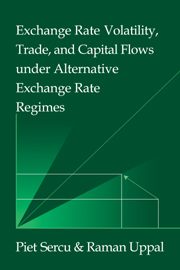Book contents
- Frontmatter
- Contents
- Acknowledgments
- Guide to Notation
- 1 Introduction and Overview
- 2 Modeling Exchange Rates: A Survey of the Literature
- 3 A Simple General-Equilibrium Model of an International Economy
- 4 The Spot Exchange Rate in a Large Class of General-Equilibrium Models
- 5 Forward Exchange Rates in a Model with Segmented Goods Markets
- 6 International Trade Flows, Exchange Rate Volatility, and Welfare
- 7 International Capital Flows and Welfare
- 8 Tariff Policy with International Financial Markets
- 9 Endogenous Monetary Policy and the Choice of Exchange Rate Regime
- 10 Concluding Thoughts
- References
- Author Index
- Subject Index
7 - International Capital Flows and Welfare
Published online by Cambridge University Press: 23 October 2009
- Frontmatter
- Contents
- Acknowledgments
- Guide to Notation
- 1 Introduction and Overview
- 2 Modeling Exchange Rates: A Survey of the Literature
- 3 A Simple General-Equilibrium Model of an International Economy
- 4 The Spot Exchange Rate in a Large Class of General-Equilibrium Models
- 5 Forward Exchange Rates in a Model with Segmented Goods Markets
- 6 International Trade Flows, Exchange Rate Volatility, and Welfare
- 7 International Capital Flows and Welfare
- 8 Tariff Policy with International Financial Markets
- 9 Endogenous Monetary Policy and the Choice of Exchange Rate Regime
- 10 Concluding Thoughts
- References
- Author Index
- Subject Index
Summary
In contrast to the preceding chapter where our focus was on trade flows, in this chapter we examine financial flows. This gives us an opportunity to evaluate the role of financial markets, which until now we had assumed were perfectly integrated across countries. In this analysis, we continue to consider commodity markets that are not fully integrated but compare scenarios where financial markets are perfectly segmented and where they are perfectly integrated. This exercise, therefore, allows us to analyze the linkages between the real and financial sectors of an open economy. Helpman and Razin (1978a), in early work, examine the relation between the financial and real sectors of international economies; Arndt and Richardson (1987) and Allen and Stein (1990) discuss why it is important to study the issues that arise in this context.
Financial flows between nations arise from saving and investment decisions, decisions that are made on the basis of intertemporal considerations. In order to account for the intertemporal nature of these decisions, we work with the model of a production economy described in Chapter 3. Obstfeld (1982) and Cole and Obstfeld (1991) explain why it is necessary to account for the intertemporal considerations that arise only in the context of a production economy.
Our main results are the following. First, we show that the welfare gains from the integration of financial markets can be substantial when financial markets are the only vehicle for risk sharing.
- Type
- Chapter
- Information
- Exchange Rate Volatility, Trade, and Capital Flows under Alternative Exchange Rate Regimes , pp. 82 - 98Publisher: Cambridge University PressPrint publication year: 2000



